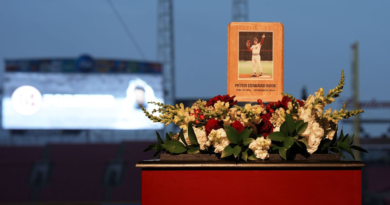Goodell: We disagree with Sunday Ticket verdict
NFL commissioner Roger Goodell said the league is committed to “following the litigation all the way” in a nearly decade-long defense of its premium Sunday Ticket product.
A Los Angeles jury ordered the NFL last month to pay $4.7 billion in damages to the residential class and another $96 million to the commercial class of a class action lawsuit that accused the league of violating antitrust laws in distributing out-of-market Sunday afternoon games on the subscription service.
The league could be liable for a total of $14.39 billion because damages are tripled under federal antitrust laws.
“We obviously disagree with the jury verdict and we are committed, obviously, to following the legal process,” Goodell said Thursday during an interview with CNBC. “It’s a long process and we’re aware of that. But we feel very strongly about our position, our policies, particularly on media.
“We make our sport available to the broadest possible audience. Sunday Ticket is just a complementary product. We’re committed to following the litigation all the way and making sure that we get this right.”
The next step is a post-trial motion hearing on July 31, when the NFL will ask Judge Philip Gutierrez to set aside the verdict. If the verdict isn’t set aside, the NFL will appeal to the 9th U.S. Circuit Court. A petition to the Supreme Court could follow.
Meanwhile, Goodell expressed optimism that NFL owners will agree to change league policy to allow private equity ownership of its teams by the end of 2024. If that happens, the league will likely cap investments at 10% per team. A committee has been working on the details since September.
“We’ve had a tremendous amount of interest and we believe that this could make sense for us in a limited fashion, probably no more than 10% of a team,” Goodell said. “But that could be something that we think could complement our ownership and support our ownership policies. We think we’re moving in a very positive direction and hopefully could have something by the end of the year.”
Sports leagues have been investigating private equity options in recent years as franchise values grow and the pool for individual team ownership shrinks.



